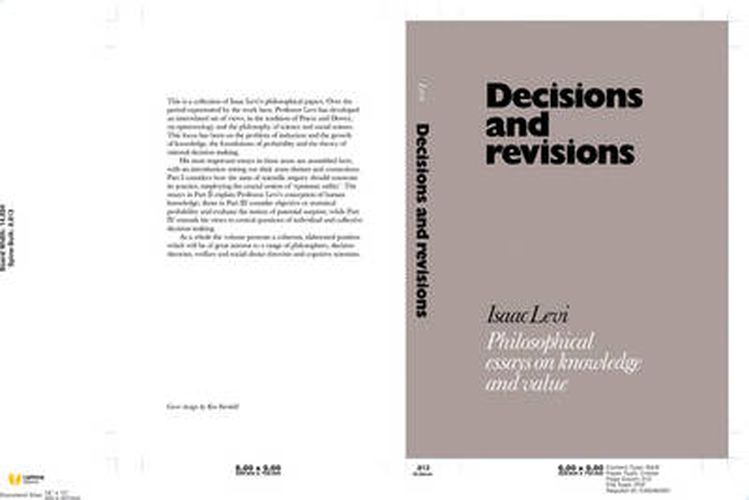Readings Newsletter
Become a Readings Member to make your shopping experience even easier.
Sign in or sign up for free!
You’re not far away from qualifying for FREE standard shipping within Australia
You’ve qualified for FREE standard shipping within Australia
The cart is loading…






This is a collection of Isaac Levi’s philosophical papers. Over the period represented by the work here, Professor Levi has developed an interrelated set of views, in the tradition of Peirce and Dewey, on epistemology and the philosophy of science and social science. This focus has been on the problem of induction and the growth of knowledge, the foundations of probability and the theory of rational decision making. His most important essays in these areas are assembled here, with an introduction setting out their main themes and connections. Part I considers how the aims of scientific inquiry should constrain its practice, employing the crucial notion of ‘epistemic utility’. The essays in Part II explain Professor Levi’s conception of human knowledge; those in Part III consider objective or statistical probability and evaluate the notion of potential surprise; while Part IV extends his views to central questions of individual and collective decision making. As a whole the volume presents a coherent, elaborated position which will be of great interest to a range of philosophers, decision theorists, welfare and social choice theorists and cognitive scientists.
$9.00 standard shipping within Australia
FREE standard shipping within Australia for orders over $100.00
Express & International shipping calculated at checkout
Stock availability can be subject to change without notice. We recommend calling the shop or contacting our online team to check availability of low stock items. Please see our Shopping Online page for more details.
This is a collection of Isaac Levi’s philosophical papers. Over the period represented by the work here, Professor Levi has developed an interrelated set of views, in the tradition of Peirce and Dewey, on epistemology and the philosophy of science and social science. This focus has been on the problem of induction and the growth of knowledge, the foundations of probability and the theory of rational decision making. His most important essays in these areas are assembled here, with an introduction setting out their main themes and connections. Part I considers how the aims of scientific inquiry should constrain its practice, employing the crucial notion of ‘epistemic utility’. The essays in Part II explain Professor Levi’s conception of human knowledge; those in Part III consider objective or statistical probability and evaluate the notion of potential surprise; while Part IV extends his views to central questions of individual and collective decision making. As a whole the volume presents a coherent, elaborated position which will be of great interest to a range of philosophers, decision theorists, welfare and social choice theorists and cognitive scientists.